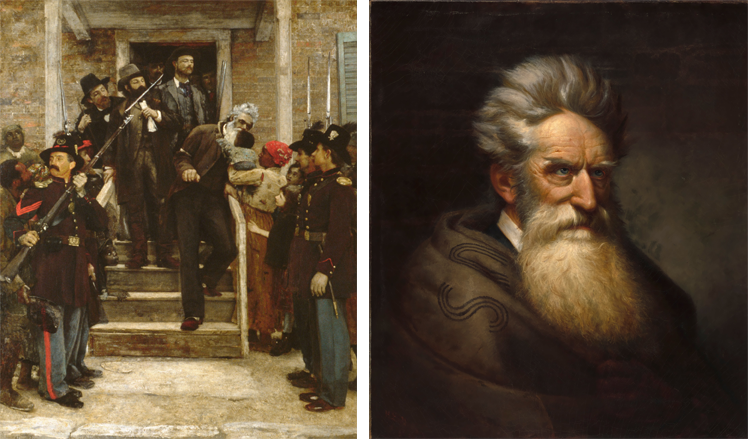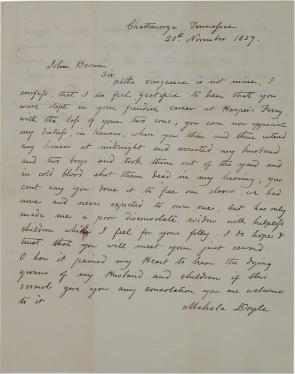John Brown Executed: On This Day, December 2
Posted by Kristin Miller on Tuesday, 12/01/2015
On December 2, 1859, John Brown went to the gallows for his failed raid on the arsenal in Harpers Ferry, Virginia. Brown was a polarizing figure. In the image to the left, based on an incident reported in the New York Tribune that later proved to be apocryphal, he appears almost saintlike. Contrast that portrayal with this wild-eyed portrait by Ole Peter Hansen Balling.

The raid on Harpers Ferry was not Brown’s first foray into slavery-related violence. After the passage of the Kansas-Nebraska Act, supporters of both slavery and free labor flooded into the territory of Kansas, where violence soon erupted. Rival governments of anti-slavery settlers and pro-slavery Missouri transplants battled it out to claim popular sovereignty in favor of their side. In retaliation for the sack of the free-state town of Lawrence on May 21, 1856, the abolitionist John Brown led a brutal attack on a pro-slavery settlement at Pottawatomie Creek. The violence alienated many anti-slavery backers.

Brown and six followers killed five men, hacking at them with broadswords and cutting their throats before shooting them. Mahala Doyle, the wife and mother of three of Brown’s victims, expressed her bitterness and pain in this letter to John Brown. She sent it to him in November 1859 as he awaited execution after the Harpers Ferry raid. Below is a transcript of her letter.
Chattanooga Tennessee
20th November 1859.John Brown
Sir
Altho vengence is not mine, I confess, that I do feel gratified to hear that you ware stopt in your fiendish career at Harper’s Ferry, with the loss of your two sons, you can now appreciate my distress, in Kansas, when you then and there entered my house at midnight and arrested my husband and two boys and took them out of the yard and in cold blood shot them dead in my hearing, you cant say you done it to free our slaves, we had none and never expected to own one, but has only made me a poor disconsolate widow with helpless children while I feel for your folly. I do hope & trust that you will meet your just reward. O how it pained my Heart to hear the dying groans of my Husband and children if this scrawl give you any consolation you are welcome to it Mahala Doyle
NB my son John Doyle whose life I begged of (you) is now grown up and is very desirous to be at Charleston on the day of your execution would certainly be there if his means would permit it, that he might adjust the rope around your neck if gov: wise would permit it
M. Doyle.